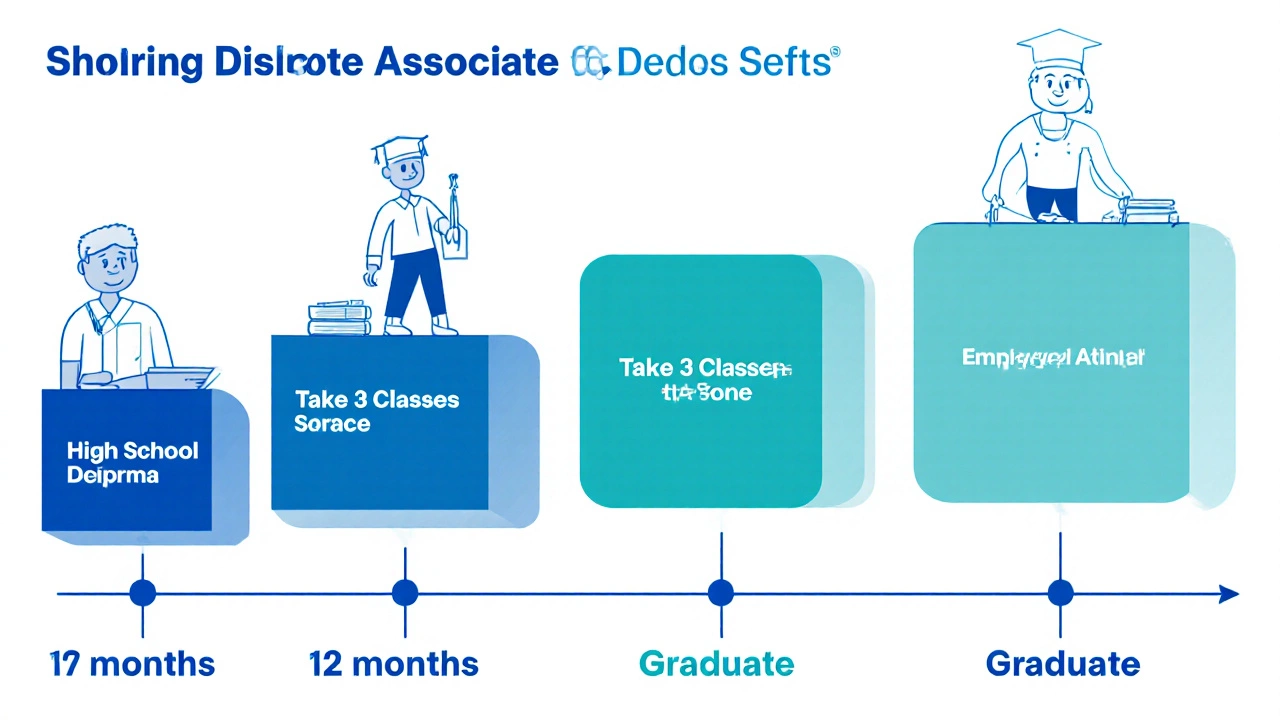Online Degree Timeline Calculator
Calculate Your Degree Timeline
Estimate how long it will take to earn your online degree based on your current situation.
Want a degree fast? You’re not alone. More people are looking for ways to boost their career without spending years in school. The good news? You can earn a real, accredited degree online in as little as one year-if you know where to look and how to plan it right.
What counts as a "degree"?
Not all certificates are degrees. A degree means it’s awarded by a college or university that’s officially recognized. In the U.S., that’s usually through regional accreditation. In India, it’s UGC or AICTE approval. If it’s not accredited, employers won’t take it seriously-even if it says "bachelor’s" on the label.
So when people ask for the "quickest degree," they mean:
- A credential that says "Associate" or "Bachelor’s"
- From a school you can verify online
- With credits that transfer or count toward jobs
That rules out 6-week "certificates" from random websites. Those help with skills, but not with formal qualifications.
Fastest options: Associate degrees
The quickest path to a real degree is an Associate of Science (AS) or Associate of Applied Science (AAS). These are two-year programs, but many schools let you finish them in 12 to 18 months if you take heavy loads and use summer terms.
Here are the most common fast-track associate degrees:
- Business Administration - Learn basics of management, accounting, marketing. Perfect for entry-level office jobs.
- Information Technology - Covers networking, cybersecurity, help desk support. High demand in remote roles.
- Health Information Technology - Manage patient records, billing systems. Great for hospitals and clinics.
- Paralegal Studies - Prepares you to assist lawyers. Many law firms hire associate-degree holders.
These programs are designed for working adults. You’ll take 10-12 courses total. Most are 8 weeks long. You can do 2-3 at a time, and some schools let you test out of intro courses if you have prior experience.
Can you get a bachelor’s in under two years?
Yes-but only if you already have college credits.
Most online bachelor’s degrees take 4 years. But if you’ve taken AP classes in high school, completed a community college associate degree, or earned credits from prior learning (like military training or corporate certifications), you can shave off 1-2 years.
For example:
- Someone with an AS in IT can finish a B.S. in Computer Science in 18 months by transferring 60 credits.
- A person with 30 credits from a previous college can complete a B.A. in Psychology in 2 years by taking 15 credits per semester.
Some schools even offer "accelerated bachelor’s" tracks for adults with work experience. They let you earn credit for skills you’ve already used on the job-like managing teams, writing reports, or using software.

What schools offer the fastest programs?
Not all online schools are equal. Here are the types that move fast:
- Public community colleges - Like Valencia College (Florida) or Austin Community College (Texas). They offer low-cost, accredited associate degrees with flexible online options.
- Nonprofit universities with adult programs - Western Governors University (WGU) is the leader here. They use competency-based learning: you move as fast as you learn. Many finish an associate degree in 6-12 months.
- Specialized online schools - Southern New Hampshire University (SNHU) and Liberty University offer 8-week terms and year-round enrollment. No waiting for semesters to start.
WGU stands out because you don’t sit through lectures. You study on your own, take exams when ready, and pay per 6-month term-not per credit. If you’re a fast learner, you can finish a bachelor’s in 12-18 months.
What about credentials that aren’t degrees?
Some people confuse fast certificates with degrees. A Google Career Certificate in Data Analytics takes 6 months. A HubSpot Inbound Marketing Certification takes 4 weeks. These are valuable-but they’re not degrees.
Here’s the difference:
| Type | Time | Accredited? | Recognized by Employers? | Can You Transfer Credits? |
|---|---|---|---|---|
| Associate Degree | 12-18 months | Yes | Yes | Yes |
| Bachelor’s Degree | 2-4 years | Yes | Yes | Yes |
| Professional Certificate | 1-6 months | No | Sometimes | No |
| Bootcamp Completion | 3-6 months | No | Varies | No |
If your goal is to get hired for a job that requires a degree-like a hospital admin role, a government position, or a corporate HR job-you need the degree. Certificates help you get in the door, but they won’t replace the credential.
How to make it even faster
Here’s how people finish degrees in record time:
- Test out of classes - Many schools let you take a CLEP or DSST exam to skip intro courses. For example, pass a CLEP exam in College Algebra and you don’t have to take the class.
- Use prior learning credit - If you’ve worked in retail management, you might get credit for a Business Management course. Ask your school about PLA (Prior Learning Assessment).
- Take 2-3 courses at once - Most students take one class at a time. Fast-trackers take 2-3. You’ll be busy, but you’ll finish faster.
- Enroll year-round - Don’t wait for fall semester. Schools like SNHU and WGU start new terms every month.
- Use employer tuition assistance - Many companies pay for degrees if they’re job-related. Check with your HR department.
One student in Ohio finished an associate degree in 10 months by testing out of 4 courses, taking 3 classes per term, and using her employer’s tuition reimbursement. She now works as a medical records coordinator with a 25% pay raise.

What to avoid
There are a lot of shady schools promising "degrees in 3 months." They’re diploma mills. Here’s how to spot them:
- They don’t list their accreditation status clearly
- They say "no exams" or "no assignments needed"
- They charge a flat fee for the whole degree
- Their website looks unprofessional or has broken links
Always check the school’s accreditation at chea.org (U.S.) or ugc.ac.in (India). If you can’t find it, walk away.
Is it worth it?
Yes-if you pick the right program.
According to the U.S. Bureau of Labor Statistics, workers with an associate degree earn, on average, $887 per week. Those with only a high school diploma earn $809. That’s $4,000 more a year. And many of these jobs are remote-friendly.
In India, an online associate degree in IT or business from a UGC-approved university opens doors to roles like junior analyst, data entry supervisor, or customer service lead in multinational companies.
It’s not about being the fastest. It’s about being smart. A degree that takes 12 months and costs $5,000 is better than one that takes 4 years and costs $40,000.
Next steps
If you’re ready to start:
- Decide what field you want-business, tech, healthcare, or education.
- Find a UGC- or regionally accredited school offering an online associate degree in that field.
- Ask if they accept transfer credits or prior learning.
- Check if they offer monthly start dates and 8-week terms.
- Apply, enroll, and take your first class in the next 30 days.
You don’t need to quit your job. You don’t need to move. You just need to start.
Can I get a degree online in 6 months?
You can’t get a full bachelor’s or associate degree in 6 months from an accredited school. But you can finish a certificate or earn enough credits to transfer into a degree program. Some competency-based schools like WGU let you finish an associate degree in as little as 10 months if you’re a fast learner and test out of courses.
Are online degrees respected by employers?
Yes-if they’re from accredited schools. Employers don’t care if you took the classes online. They care if the school is recognized. Degrees from schools like SNHU, WGU, or public universities are accepted everywhere. Avoid schools with no accreditation or vague names like "Global University of Online Learning."
What’s the cheapest fast online degree?
Community colleges offer the lowest cost. In the U.S., an online associate degree can cost as little as $3,000-$6,000 total. In India, UGC-approved universities like IGNOU charge under ₹20,000 for a full program. Look for schools with flat tuition per term, not per credit.
Do I need to be tech-savvy to take online classes?
No. Most online programs use simple platforms like Canvas or Blackboard. You’ll need basic skills: uploading files, watching videos, using email. If you can use WhatsApp or Netflix, you can handle online classes. Schools offer free orientation sessions to help you get started.
Can I get financial aid for fast online degrees?
Yes. In the U.S., you can apply for FAFSA for federal aid. In India, you can apply for scholarships through UGC, state governments, or the National Scholarship Portal. Many schools also offer payment plans so you pay as you go.
